বিদেশে পাড়ি জমানো কিংবা জুতসই একটা চাকুরী প্রত্যাশা, ইংরেজি ভাষায় নিজের দক্ষতা প্রমাণের জন্য IELTS পরীক্ষার গুরুত্ব কতোটুকু তা বলার অপেক্ষা রাখেনা। আজকের লেখায় থাকছে IELTS পরীক্ষার চারটি অংশের অন্যতম একটি – IELTS Speaking এর আদ্যোপান্ত।
বেশিরভাগ IELTS পরীক্ষার্থীর মূল সংকোচের জায়গা থাকে IELTS Speaking এ। অনেকসময় দেখা যায়, খুব ভালো ইংরেজি জানলেও আমরা কথা বলার সময় হিমশিম খাই। বিদেশি একটা ভাষা আয়ত্ত করে ফেলার পরেও সহজ সাবলীলভাবে বলতে পারা বেশ কঠিন মনে হয় আমাদের কাছে। পাশাপাশি সংকোচ, লজ্জা এসব তো আছেই। এমন কারণগুলোই মূলত IELTS Speaking এ কাঙ্ক্ষিত স্কোর পাওয়ার পথে অন্তরায় হয়ে দাঁড়ায়।
এই লেখায় তাই IELTS Speaking Questions এর ধরণ, মানবণ্টন, IELTS Speaking part 1, IELTS Speaking part 2, part 3 প্রস্তুতির পাশাপাশি শেয়ার করবো সর্বোচ্চ স্কোর পাওয়ার কয়েকটি টিপস।
কোর্সটি করে যা শিখবেন:
IELTS Course by Munzereen Shahid
IELTS Speaking Test এর ধরন:
IELTS (International English Language Testing System) এর মোট চারটি ভাগের মাঝে Speaking Test একটি। এটি হচ্ছে একজন মানুষের ইংরেজি ভাষায় কথা বলার দক্ষতা পরিমাপ করার মানদণ্ড। IELTS Speaking -কে তিন ভাগে ভাগ করা হয়- IELTS Speaking part 1, IELTS Speaking part 2 এবং IELTS Speaking part 3।
টেস্টটি তিনটি ভিন্ন সেকশনে ১১-১৪ মিনিট পর্যন্ত নেয়া হয়।
একজন মানুষ দৈনন্দিন জীবনের ব্যবহৃত ইংরেজি ভাষা কতোটুকু বুঝতে পারে, নিজে কতোটুকু দক্ষতার সাথে ব্যবহার করতে পারে, মূলত এটার ধারণাই দেয় স্পিকিং টেস্ট থেকে পাওয়া ফলাফল।
IELTS Speaking Test এর তিনটি ভাগ নিয়ে আলোচনা করছি এখানে।
আরো পড়ুন: মজার নিয়মে vocabulary 5: ২০১৮ সালের মজার ১০টি নতুন শব্দ!
IELTS Speaking part 1; Introduction and Interview-
এই অংশকে পরিচিতি পর্ব বলা যেতে পারে। পরীক্ষক প্রথমে নিজের পরিচয় দিয়ে শুরু করবেন, এরপর পরীক্ষার্থীকে নিজের ব্যপারে বলতে বলবেন। প্রথমে আপনাকে সাধারণ কিছু প্রশ্ন জিজ্ঞেস করতে পারেন। যেমন – আপনার নাম, জন্মস্থান, পেশা ইত্যাদি।
এই অংশটি মূলত ডিজাইন করা থাকে পরীক্ষার্থীকে ভারমুক্ত করার জন্য, যেন আপনি সংকোচ কাটিয়ে সাবলীলভাবে কথা বলা শুরু করতে পারেন। কথা বলার এক পর্যায়ে পরীক্ষক আপনার ভাষাগত দক্ষতা বোঝার জন্য আপনার শখ, আপনার পছন্দের বিষয় ইত্যাদি প্রাথমিক ব্যপার নিয়েও জিজ্ঞেস করতে পারেন।

IELTS Speaking part 2; Long Turn-
পরীক্ষার এই পর্যায়ে আপনাকে একটি টাস্ক কার্ড দেয়া হবে। কার্ডে নির্দিষ্ট একটি টপিক লেখা থাকবে এবং আপনাকে ওই টপিকের ওপর ১-২ মিনিট অনর্গল কথা বলতে হবে। নিশ্চয়ই মনে কৌতুহল হচ্ছে যে টপিকের ধরণ কেমন হবে? সবার আগে আমি বলবো, এই নিয়ে বেশি দুশ্চিন্তা করবেন না। আপনার কোনো ধারণাই নেই, এমন কোনো টপিক আপনাকে দেয়া হবেনা। একটা কথা মনে রাখবেন, এই টেস্ট আপনার স্পোকেন ফ্লুয়েন্সি মাপার জন্য, আপনার জ্ঞান মাপার জন্য না। (তাই বলে সাজিয়ে-গুছিয়ে যাচ্ছেতা বলে আসাটা আবার মোটেই ভাল হবেনা!)
IELTS Speaking part 2 এর এই টপিকগুলো সাধারণত দৈনন্দিন জীবনের কোনো ঘটনা কেন্দ্র করে হয়। আপনাকে হয়তো কোনো একটা অনুভূতি নিয়ে বলতে বলা হবে, কিংবা কোনো অভিজ্ঞতা নিয়ে, কোনো জায়গা নিয়ে কিংবা নির্দিষ্ট একটি ব্যপারে আপনার মতামত নিয়ে। পরীক্ষক আপনার টপিকের ওপর একটা মোটামুটি বিস্তারিত ধারণা আশা করবেন। আপনার ভোকাবুলারি আর গ্রামারের ব্যবহারও এই অংশে ধরা হবে।
ব্লগের শেষে IELTS Speaking part 2 এর কয়েকটি উদাহারণ তুলে দিচ্ছি।
IELTS Speaking part 3; Two-Way Discussion-
IELTS Speaking এর এই অংশে আবার চলে আসবে আপনার এবং পরীক্ষকের কথোপকথন। যেই টপিকের ওপর আপনি Part 2 এর টেস্ট দিয়েছেন, সেই টপিকেই পরীক্ষক আপনার সাথে কথা বলবেন। এইবার অবশ্য আলোচনা আরেকটু গভীর, আর অর্থবহ হবে।
পরীক্ষার এই পার্ট মূলত রাখা হয়েছে যেন আপনি পরীক্ষকের সাথে অর্থবহ একটা কথোপকথন চালাতে পারেন। এখানে আপনার কমিউনিকেশান স্কিল, আপনার কথাগুলো অন্য একজনকে সহজে বুঝিয়ে বলার ক্ষমতা, নিজের মতামত প্রকাশ করতে পারা, আর ইংরেজিতে কথোপকথন চালিয়ে যাবার ব্যপারগুলো যাচাই করা হবে।
IELTS Speaking Marking Criteria:
IELTS Speaking test এ নম্বর মূলত চারটি বিষয়ের ওপর নির্ভর করে দেয়া হয়-
1) Fluency and coherence (FC);
অর্থাৎ আপনি ইংরেজি ভাষায় কথা বলার ক্ষেত্রে কতোটা সাবলীল, এবং অন্য কারো সাথে একটি কথোপকথনে আপনি আপনার সব কথার মাঝে সামঞ্জস্য ধরে রাখতে পারছেন কিনা। FC তে ভালো করতে আপনি যেসব ব্যপারে লক্ষ্য রাখবেন:
- আপনার বলা শব্দ এবং বাক্যগুলো টপিকের সাথে কতোটুকু সামঞ্জস্যপূর্ণ, লক্ষ্য করুন।
- আপনার উত্তরকে সংক্ষিপ্ত না করে যত সম্ভব বিস্তারিত বলার চেষ্টা করুন। কোনো পয়েন্ট বাদ দিবেন না।
- কথা বলার সময় তাড়াতাড়ি বলার চেষ্টা না করে বরং ধীরে-সুস্থে গুছিয়ে বলুন।
- কথার মাঝে বিরাম চিহ্ন সঠিকভাবে ব্যবহারের দিকে লক্ষ্য রাখুন।
2) Lexical Resource (LR);
অর্থাৎ আপনার শব্দভান্ডার কতোটুকু সমৃদ্ধ। LR এ ভালো নম্বর পেতে যা করবেন:
- কথার মাঝে বৈচিত্র্যপূর্ণ শব্দ ব্যবহারের চেষ্টা করুন।
- বিভিন্ন বিষয় নিয়ে সাবলীলভাবে কথা বলা শুরু করুন, তাহলে আপনার জানা অনেক শব্দ এমনিই উঠে আসবে।
- Formally অথবা Semi-formally কথা বলুন।
- শব্দচয়নের ক্ষেত্রে বিশেষ খেয়াল রাখুন ।
- যতোটা সম্ভব Idiomatic language ব্যবহার করার চেষ্টা করুন।
3) Pronunciation (P);
অর্থাৎ আপনার উচ্চারণ কতোটা সাবলীল এবং স্বাভাবিক শোনায়। Pronunciation এ ভালো নম্বর পেতে হলে খেয়াল রাখবেন যেসব দিকে:
- যতোটা সম্ভব স্পষ্ট করে আপনার শব্দগুলো উচ্চারণ করুন।
- প্র্যাক্টিসের সময় আপনার কথা রেকর্ড করুন, এবং কোন কোন জায়গায় উচ্চারণ ভুল করছেন তা খুঁজে বের করে সংশোধন করুন।
- যেই শব্দের ক্ষেত্রে যেমন টান ব্যবহার করা দরকার সেটি মেনে চলুন। Intonations এর সঠিক ব্যবহার করুন।
- চেষ্টা করুন এমনভাবে আপনার কথাগুলো বলার, যেন পরীক্ষক আপনাকে সহজেই বুঝতে পারেন।
4) Grammatical Range and Accuracy (GRA)
অর্থাৎ ব্যাকরণ এ আপনি কতোটা দক্ষ। GRA তে ভালো করতে যেসব দিক অবশ্যই মাথায় রাখবেন:
- অবশ্যই চেষ্টা করবেন ব্যাকরণগত ভুল এড়িয়ে চলতে। এজন্য প্রচুর প্র্যাক্টিস করতে হবে।
- Passive voice, Direct speech, Different tenses, Conditional sentences ইত্যাদির মতো অ্যাডভান্সড ব্যাকরণিক দিক বেশি বেশি ব্যবহার করার চেষ্টা করা যেতে পারে।
IELTS Speaking Mark Distribution and Score Calculation;
উপরের চারটি বিষয়ের প্রতিটিতে ০-৯ পর্যন্ত নম্বর বরাদ্দ থাকে। প্রতিটি অংশের প্রাপ্ত নম্বর নিয়ে সেগুলোর গড় করা হয়। এই গড়ই আপনার IELTS Speaking এর score হিসেবে গণ্য হবে। যেমন ধরুন, আপনার প্রাপ্ত নম্বর হচ্ছে FC – 7, P – 8, LR – 7 এবং GR – 6, তাহলে আপনার মোট নম্বর হবে (7+8+7+6)/4 = 7
আবার ধরুন আপনার প্রাপ্ত নম্বরগুলো হচ্ছে FC : 7.5, P: 7.0, LR: 7.0, GRA – 7.5.
এক্ষেত্রে আপনার মোট প্রাপ্ত নম্বরের গড় করলে দাঁড়ায় (7.5+7.0+7.0+7.5)/4 =7.25, যেটা বাড়িয়ে 7.5 ধরে নেয়া হবে।
IELTS Speaking Test -এ ভালো করবেন যেভাবে:
উপরেও বলেছি, অনেকের জন্যই ইংরেজি লিখতে-বুঝতে পারা সহজ হলেও বলতে পারাটা কঠিন হয়ে দাঁড়ায়। এটি মূলত দুটি কারণে হয়।
- কোনো প্রশ্নের উত্তর দেবার ক্ষেত্রে চিন্তা করার জন্য বেশি সময় পাওয়া যায়না।
- কথা বলার ক্ষেত্রে পরিমিত প্র্যাক্টিসের অভাব।
এই সমস্যার কোনোটাই Reading, Writing এবং Listening এর ক্ষেত্রে দেখা যায়না। কারণ, এগুলোর প্রতিটির আগে একটু হলেও ভাববার সময় পাওয়া যায়। কিন্তু IELTS Speaking Test এর সময় পরীক্ষক সামনে বসা থাকেন, সরাসরি প্রশ্ন করেন এবং তাৎক্ষনিক উত্তরও প্রত্যাশা করেন। এজন্য ভাববার সময় তো দুরের কথা, উল্টো একটা চাপ তৈরী হয়, যার জন্য পুরো বিষয়টা কঠিন মনে হতে পারে।
দ্বিতীয়ত, ক্লাসে, বন্ধুদের আড্ডায় এমনকি ইন্টারনেটেও আমাদের ইংরেজি শোনার, লেখার আর পড়ার প্র্যাক্টিস হয়। কিন্তু বলার প্র্যাক্টিস কি আদৌ হয়? হলেও তা হয় খুবই কম। তাই আমাদের মাঝে একটা সংকোচ রয়ে যায়।
নিচে IELTS Speaking এ ভালো করার দুর্দান্ত নয়টি টিপস দিচ্ছি, যা আপনার IELTS Speaking প্রস্তুতি ভালো করতে, সমস্যাগুলো কাটিয়ে উঠতে, এবং কাঙ্ক্ষিত নম্বর পেতে সাহায্য করবে।
1) ইংরেজিতে চিন্তা করুন:
ইংরেজিতে চিন্তা করুন। IELTS Speaking এ ভালো করতে আপনার জন্য সবচেয়ে গুরুত্বপূর্ন পরামর্শ হয়তো এটাই। এই অভ্যাসটি গড়ে তোলা একই সাথে অনেক সহজ, এবং সবথেকে বেশি কার্যকরী। কারণ আপনি যখন ইংরেজিতে চিন্তা করবেন, তখন কিন্তু একইসাথে মনে মনে আপনার ইংরেজি প্র্যাক্টিসও হয়ে যাচ্ছে! ভেবে দেখুন, এরচেয়ে সহজ , আর কম পরিশ্রমের প্র্যাক্টিস আপনি আর একটাও পাবেন না!
ইংরেজিতে চিন্তা করার অভ্যাস হয়ে গেলে যেটা হবে, কথা বলার সময় আপনি আগের চেয়ে দ্রুত এবং নির্ভুলভাবে কথা বলতে পারবেন। কোনো একটা চিন্তাকে ইংরেজিতে অনুবাদ করতে হবেনা, কারণ আপনি চিন্তাটাই করেছেন ইংরেজি শব্দগুলোকে মাথায় রেখে!আপাতদৃষ্টিতে ব্যাপারটি আপনার কাছে কঠিন মনে হতে পারে, কিন্তু একবার আয়ত্ত করে ফেলতে পারলে এই ব্যপার আপনাকে অনেক সাহায্য করবে।
‘ইংরেজিতে কথা বলিনা, কারণ আমার ইংরেজিতে কথা বলার পার্টনার নাই’ – এই কথাটা আপনি নিজে হয়তো জীবনে অনেকবারই বলেছেন। নিজে না বলে থাকলেও শুনেছেন তো অবশ্যই!আপনার জন্য পরামর্শ, স্পিকিং পার্টনার নেই এজন্য ইংরেজিতে কথা বলিনা- এই ধরণের কথা এক্ষুনি মাথা থেকে ঝেড়ে ফেলে দিন। কথা বলার কেউ না থাকলে কী, ইংরেজিতে চিন্তা করার জন্য একটা মস্তিষ্ক তো আছে নাকি?
আরো পড়ুন: কাঙ্ক্ষিত IELTS Reading Score অর্জনের ১০টি সেরা টিপস!
2) নিয়ম করে IELTS-Style Questions সমাধান করুন
প্রতি সপ্তাহের শিডিউলে আগে থেকে সময় বের করে রাখুন মক টেস্ট দেবার জন্য। এটা শুধুমাত্র IELTS Speaking এর ক্ষেত্রে না, IELTS Listening, IELTS Writing এবং IELTS Reading এর ক্ষেত্রেও সমানভাবে প্রযোজ্য।
প্রতি সপ্তাহে অন্তত দুইটি মক স্পিকিং টেস্ট দিন। যদি সম্ভব হয়, আরো বেশি দিন। হতে পারে সেটা ছুটির দিনে, অথবা দিনশেষে সব কাজের পর। আপনার কতোটুকু ভালো করার প্রয়োজন, কোন কোন জায়গায় আপনি আটকে যাচ্ছেন, কোন জায়গাগুলোতে ভালো করছেন – এগুলো বুঝতে হলে মক টেস্টের বিকল্প নেই।
যদি একান্তই সপ্তাহে দুটো না পারেন, অন্তত একটি মক টেস্ট দিন। প্রথম দিকে সময়ের কথা চিন্তা না করে নিজের সর্বোচ্চটা দিন। এরপর আস্তে আস্তে সময়ের মধ্যে টেস্ট দেবার অভ্যাস করুন। এই প্র্যাক্টিসই আপনাকে পরীক্ষার সময় সবথেকে বেশি সাহায্য করবে।
একা একা প্র্যাক্টিসের ক্ষেত্রে চেষ্টা করবেন আপনার উত্তরটি জোরে পড়তে, এবং রেকর্ড করতে। এতে করে সহজে আপনার মাথায় উত্তরটি গেঁথে যাবে, আর পরবর্তীতে রেকর্ডিংটি শুনলে রিভিশানও হয়ে যাবে। গ্রুপে প্র্যাক্টিস করলেও রেকর্ড করার অভ্যাস করুন।
IELTS LIVE Batch
এই কোর্সটি আপনাকে কীভাবে সাহায্য করবে?
3) নিয়মিত শব্দভান্ডার বাড়ান
IELTS Speaking এর ক্ষেত্রে আপনার পঁচিশ পার্সেন্ট নম্বর কিন্তু ভোকাবুলারিতে। সুতরাং যত যা-ই হোক, ভালো স্কোর করতে ভোকাবুলারি প্র্যাক্টিস করা চাই। এক্ষেত্রে আপনি যত বেশি শব্দ জানবেন, তত ভালো। শব্দভান্ডার বাড়াতে পারলে শুধু স্পিকিং না- রিডিং, রাইটিং আর লিসেনিং এও আপনার ভালো নম্বর পাবার সম্ভাবনা অনেকগুনে বাড়বে।
এখানে দুটো লিংক দিচ্ছি, এগুলো ভোকাবুলারিতে আরো ভালো প্রস্তুতি নিতে আপনাকে সাহায্য করবে।
4) পরীক্ষার সম্পর্কে জানুন
নিজেকে প্রশ্ন করে দেখুন, IELTS Speaking পরীক্ষার সবগুলো পার্ট নিয়ে আপনি কি যথেষ্ট জানেন? যদি উত্তর না হয়, তবে বিস্তারিত জানার চেষ্টা করুন। অল্পস্বল্প জানা আছে? তাহলে আরো ভালো করে জানার চেষ্টা করুন।
আপনাকে কেমন প্রশ্ন করা হতে পারে, প্রশ্নের ফরম্যাট কেমন, কতক্ষন যাবৎ পরীক্ষা হবে- থেকে শুরু করে যারা ইতোমধ্যে পরীক্ষা দিয়েছেন তাদের অভিজ্ঞতা; এসব আপনার নখদর্পনে থাকতেই হবে। কারণ পরীক্ষা দিতে গিয়ে আপনি এসবের কিছুই বুঝে ওঠার সময় পাবেন না!
আগে থেকে আঁটঘাঁট না বেঁধে যদি পরীক্ষা দিতে চলে যান, তাহলে বলা যায় আপনি সাঁতার না জেনে চৌবাচ্চায় ডুব দিলেন। (হয়তো ডুববেন না, কিন্তু নাকানিচুবানি তো খাবেনই!)
যদি আপনার আগে থেকেই জানা থাকে যে আপনি কিসের মুখোমুখি হচ্ছেন, তাহলে আপনার যুদ্ধ একশো গুন সহজ হয়ে যাবে!

IELTS-এর ফ্রি ক্লাসে জয়েন করতে ক্লিক করুন এই লিঙ্কে: Book Your Free Class @ 10MS English Centre, Uttara
5) নিজের দুর্বল দিক আর শক্ত দিক সম্পর্কে জানার চেষ্টা করুন
শুধু ইংরেজির ক্ষেত্রেই না, যেকোন ভাষার ক্ষেত্রে আপনাকে এই ব্যপারে লক্ষ্য রাখতে হবে। নতুন ভাষা শেখার ক্ষেত্রে কমবেশি সবাই-ই এই সমস্যায় পড়েন- নিজের ভুলগুলো নিজে ধরতে পারেন না, আবার কোন দিকে ভালো করছেন সেটাও ঠিকঠাক বুঝে উঠতে পারেন না।
এক্ষেত্রে আমার পরামর্শ, নিজেকে মিথ্যা কিছু বোঝাবেন না। নিজের কোনো কমতির ব্যাপারে জানা মাত্র স্বীকার করবেন, এবং সেটা কিভাবে ঠিক করা যায় এর চেষ্টা করবেন। নিজেকে জিজ্ঞেস করুন- আপনি speaking English এর কোন দিকটিতে সবথেকে কম পারদর্শী? fluency and coherence, vocabulary, grammar নাকি pronunciation? নাকি চারটিই? আপনি পারদর্শী নন, এটা কোনো সমস্যা না। সমস্যা তখনই হবে যখন আপনি আপনার দুর্বলতার দিকগুলো জানতে পারবেন না।
এক্ষেত্রে অনেক বেশি প্র্যাক্টিস করা আপনার কাজে দিবে। বেশি বেশি মক টেস্ট দিন, নিজেকে যতো বেশি সম্ভব যাচাই করুন। মক টেস্টে প্রাপ্ত নম্বরের ওপর ভিত্তি করে নিজেকে যাচাই করুন। কয়েকটি মক টেস্টের নম্বর এক করে দেখুন, কোন বিষয়ে আপনার নম্বর আশানুরুপ আসছেনা। ভুল বেশি থাকলেও দুশ্চিন্তার কোনো কারণ নেই, কারণ আপনি ভুল খুঁজে বের করতে পেরেছেন। এখন বাকি শুধু সমাধান করা!
7) Grammatical Structures গুলো চিহ্নিত করুন
স্পোকেন টেস্টের ক্ষেত্রে Grammatical Structures বেশ গুরুত্বপূর্ণ। আপনি হয়তো শুনে থাকবেন, কথা বলার ক্ষেত্রে গ্রামার জরুরী না। কিন্তু IELTS Speaking এর ক্ষেত্রে এই নিয়ম খাটবে না। অবশ্যই আপনাকে লক্ষ্য রাখতে হবে যেন কথা বলার ক্ষেত্রে ব্যাকরণগত ভুল না হয়।
Tense এর সঠিক ব্যবহার এক্ষেত্রে অনেক বেশি জরুরী। নিচের উদাহারণ লক্ষ্য করুন-
Question: Have you ever been abroad?
Subira: I’m going to the USA in September.
এখানে প্রশ্নটি করা হয়েছে past tense-এ, কিন্তু উত্তর দেয়া হয়েছে future tense-এ। এক্ষেত্রে ধরে নেয়া হবে, যে Subira প্রশ্নটির উত্তরই দেয়নি!
তাহলে Subira কীভাবে উত্তর দিতে পারতো?
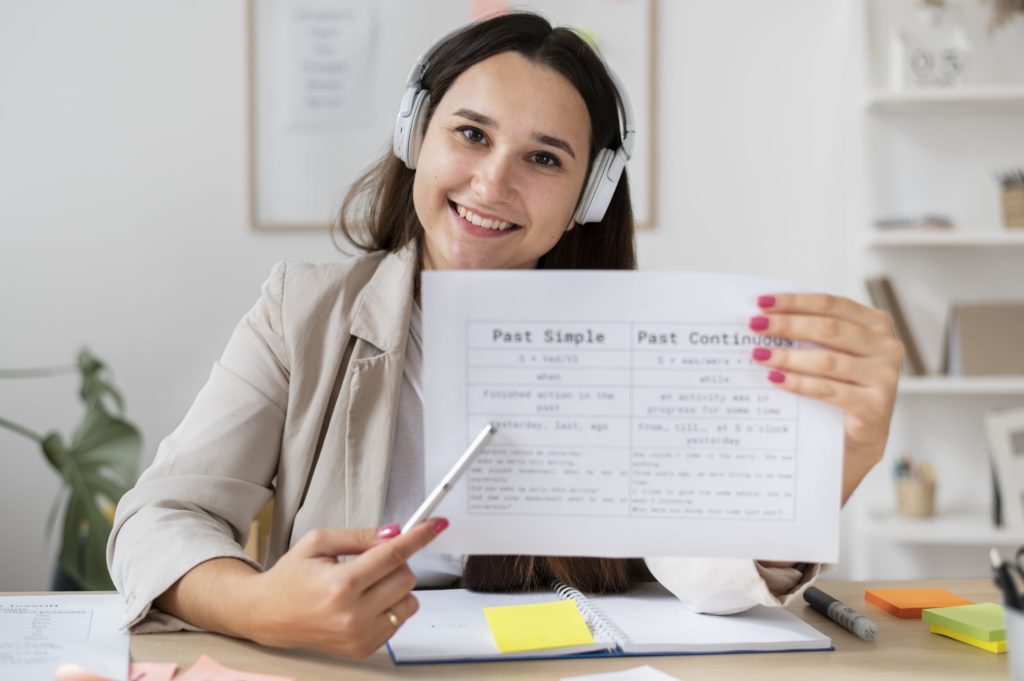
এমন উত্তরের ফলে Subira শুধুমাত্র সঠিক Tense -ই ব্যবহার করেনি, future tense হিসেবে একটা clause ও যোগ করেছে। এর ফলে সে ভালো নম্বর পাবে বলে আশা করা যায়।
তাহলে সঠিক tense ব্যবহার করে প্রশ্নের উত্তর দিতে হলে আমাদের যা করতে হবে-
- Answer the question.
- Answer using the same tense as in the question।
8) Fluency এর দিকে বিশেষ নজর রাখুন
এই ব্যপারটা একদম প্রথম টিপস টার সাথে সম্পর্কযুক্ত। আবারো মনে করে দিচ্ছি- ইংরেজিতে চিন্তা করুন!
আমাদের অনেকের fluency তে সমস্যা হয় ভুল করার ভয় থেকে। কোনো কথা বলতে গেলেই আমরা ভয় পাই- ভুল হয়ে যাচ্ছেনা তো? Speaking English এর ক্ষেত্রে Fluency যেহেতু অনেক বেশি অবদান রাখে, তাই আমাদের Fluency নিশ্চিত করতে হবে।
কীভাবে করবেন? উত্তর উপরে দিয়েই দিলাম। ইংরেজিতে চিন্তা করা শুরু করা মানে, আপনি ইংরেজিতে নিজের সাথে কথা বলছেন। আপনার প্র্যাক্টিস হচ্ছে। এই প্র্যাক্টিসটাই fluencyর জন্য সবথেকে জরুরী। আর fluency তে যেহেতু মোট নম্বরের 25% আছে, তাই আপনাকে অবশ্যই এই ব্যাপারে মনোযোগ দিতে হবে!
fluency বাড়ানোর জন্য দুটো টিপস আমি এখানে দিচ্ছি-
- দিনশেষে বসে আপনার পুরো দিনের যেকোনো একটি ভালো অথবা খারাপ ঘটনা নিয়ে ভাবুন, এরপর সেই চিন্তাটা জোরে জোরে বলুন। প্রথমে চেষ্টা করুন অন্তত এক মিনিট অনর্গল কথা বলে যেতে, এরপর আস্তে আস্তে সময় বাড়ান। Tense এর দিকে লক্ষ্য রেখে কথা বলবেন।
- আপনার সামনে থাকা দৈনিক পত্রিকা অথবা ম্যাগাজিনের একটা ছবির দিকে তাকান, এরপর সেই ছবিটি নিয়ে কথা বলুন। বলার সময় সুন্দর করে, উচ্চারণের নিয়ম মেনে বলার দিকে নজর দিন।
আপনার কথাগুলো রেকর্ড করু, পুনরায় শুনুন, এবং ভুল থাকলে সেটা সংশোধনের চেষ্টা করুন। এটি আসলে অনেক কাজে দেয়।
9) এবার পালা Pronunciation এর!
পরীক্ষক আপনার ব্যাপারে শুরুর দিকেই যেটি লক্ষ্য করবেন, তার মাঝে একটি Pronunciation; কেননা ‘কেমন আছো’- প্রশ্নের উত্তরে আপনি কী বলতে পারেন সেটা সবাই জানে। আপনি কীভাবে বলছেন, সেটা আপনাকে প্লাস পয়েন্ট এনে দিবে। আর প্লাস পয়েন্ট পাওয়ার জন্য আপনার Pronunciation অত্যন্ত জরুরী।
আপনার Poor pronunciation এর কারণে পরীক্ষক যদি আপনার কোনো কথা বুঝতে না পারেন, তাহলে আপনি সরাসরি ঝামেলায় পড়ে যেতে পারেন। এজন্য সবসময় চেষ্টা করবেন স্পষ্ট, গোটা গোটা ভাষায় কথা বলতে। যেই শব্দের উচ্চারণ যেমন, সেই শব্দ সেভাবে উচ্চারণ করার প্র্যাক্টিস করতে হবে।
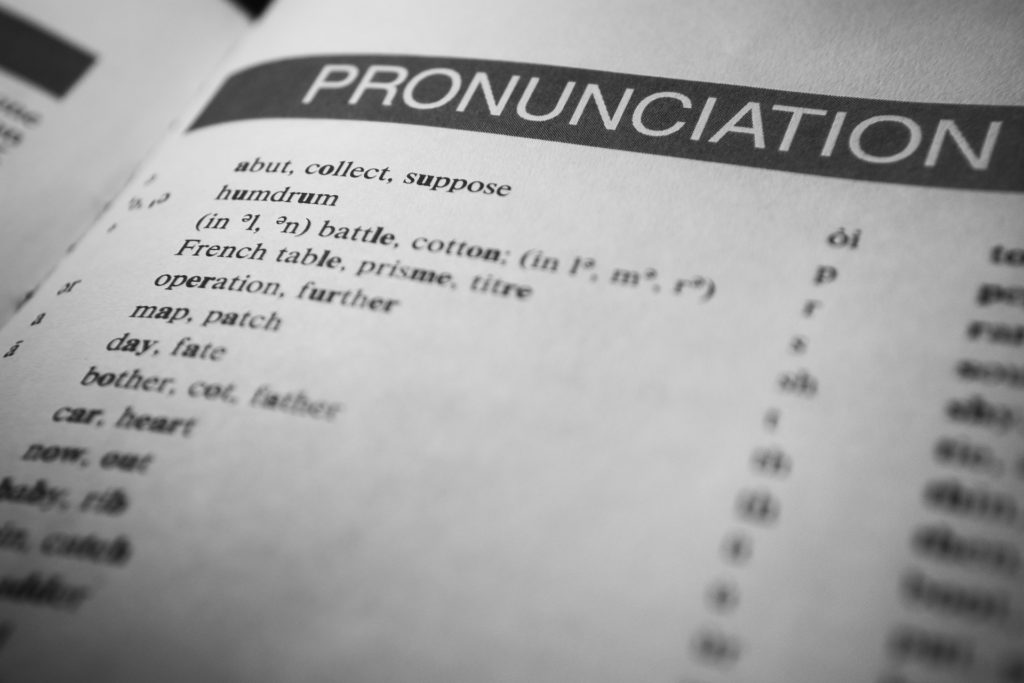
অবশ্যই, আপনার কাছে ইংরেজদের মতো ইংরেজি আশা করা হবেনা। প্রতিটি এলাকার নিজ নিজ ইংরেজি বলার ধরণ থাকে, যেটাকে ওই এলাকার accent ধরা হয়। আপনার accent ইংরেজদের মতোই হতে হবে এমন না। কিন্তু পরীক্ষক যেন সহজে বুঝতে পারেন, আপনার কথা যেন শ্রুতিমধুর হয়, এই দিকগুলো আপনাকে লক্ষ্য রাখতে হবে।
বলে রাখা ভালো, Pronunciation কিন্তু অন্যান্য গুরুত্বপূর্ণ বিষয় যেমন: gramar, Fluency এর মতো অপরিহার্য না। Pronunciation হচ্ছে কেকের উপরের চেরির মতো। না থাকলে বিশাল কিছু হয়ে যাবে এমন না, কিন্তু থাকলে একটা পূর্ণতা আসে!
IELTS Speaking Part 1 examples:
Example 1
Topic: Hobbies and interests
| Examiner: Can you tell me about your hobbies and interests?
Respondent: Yes, certainly. I have a few hobbies that I really enjoy. One of my favorite hobbies is reading. I love to escape into different worlds through books and learn new things. I mostly read fiction, but I also enjoy reading non-fiction books about science and history. Another hobby of mine is photography. I love to take pictures of nature and wildlife. I find it fascinating to capture the beauty of the world through my lens. I have a good camera that I use for my photography, and I spend most of my weekends exploring new places to take pictures. Finally, I enjoy playing sports. I play soccer and basketball regularly with my friends. I find sports to be a great way to stay active and healthy. I also enjoy the competitive aspect of sports and the sense of teamwork it requires. Examiner: That’s great! What kind of books do you like to read? Respondent: I love to read a variety of books, but my favorite type of book is science fiction. I find it fascinating to imagine futuristic worlds and new technologies. I also enjoy reading about the potential for space exploration and the mysteries of the universe. |
Example 2
Topic: Favorite Holiday Destination
| Question: Can you tell me about your favorite holiday destination?
Answer: Absolutely! My favorite holiday destination is a small island called Bali in Indonesia. I love how relaxed and laid-back the atmosphere is, and the stunning natural beauty of the island is truly breathtaking. Question: Why do you like Bali so much? Answer: I like Bali so much because it has a unique and peaceful atmosphere that I can’t find anywhere else. The island is surrounded by beautiful beaches, and the lush green hills provide a stunning backdrop for a relaxing holiday. Question: What activities do you enjoy doing in Bali? Answer: When I visit Bali, I love to take part in yoga classes, surf and explore the local culture by visiting temples and participating in traditional dances. Question: How has Bali changed since you first visited? Answer: Bali has changed quite a bit since I first visited. It’s become much more popular with tourists, so there are now more restaurants, hotels, and shops. However, despite the increase in tourism, the island has managed to maintain its unique charm and peaceful atmosphere. |
Example 3
Topic: Favorite place in your hometown
| Question: Can you describe your favorite place in your hometown?
Answer: Absolutely! My favorite place in my hometown is the local botanical garden. It’s such a peaceful and beautiful place, with a variety of different flowers, trees, and plants from all over the world. I love going there to just sit and relax, and it’s also a great place to take photos. Question: What do you like most about the botanical garden? Answer: I love how peaceful and tranquil the botanical garden is. It’s a great escape from the busyness of everyday life, and it’s just so beautiful to see all the different plants and flowers. Question: Are there any special events held at the botanical garden? Answer: Yes, the botanical garden holds several special events throughout the year, like guided tours, concerts, and workshops. I think these events add to the overall experience of visiting the garden. Question: How often do you visit the botanical garden? I try to visit the botanical garden at least once a month. It’s a great place to go for a walk and just relax, so I try to make time for it whenever I can. |
50 topics for IELTS speaking part 2:
- Your hometown
- Your family
- Your daily routine
- Your favorite food
- Your favorite season or weather
- A place you would like to visit in the future
- A place you have recently visited
- Your favorite subject in school
- Your hobbies or interests
- Your favorite movie or book
- A subject you are knowledgeable about
- Your future plans or goals
- Your favorite type of music
- Your favorite type of dance
- Your favorite type of art
- A tradition or custom in your country
- A celebration or festival you have participated in
- A place you would like to live in the future
- A memorable experience from your childhood
- A subject you would like to learn more about
- Your favorite type of animal
- A place you feel most comfortable
- A place you feel most uncomfortable
- A sport or physical activity you enjoy
- A type of food you have tried for the first time and liked
- A place you have lived that you would like to return to
- A place you have lived that you would never return to
- A person who has had an impact on your life
- Your favorite type of transportation
- A memorable travel experience
- A current news event you are following
- A personal goal you have set for yourself
- A place you feel most connected to nature
- A place you feel disconnected from nature
- A personal fear or phobia you have
- A decision you regret making
- A personal challenge you are currently facing
- A change you would like to see in your community
- A change you would like to see in the world
- Your favorite subject in school or university
- A personal belief or value that is important to you
- A person you would like to meet and why
- A piece of advice you have received that has had a lasting impact on you
- A personal belief or value that has changed over time
- A book or movie that has had a profound impact on you
- A memorable moment from your teenage years
- A technology you could not live without
- A new technology you are interested in
- A natural disaster that has affected you or someone you know
- An accomplishment you are proud of.
IELTS Speaking Part 3 examples:
Example 1
| Question: Do you think technology has a positive or negative impact on society?
Answer: It’s definitely a double-edged sword. On one hand, technology has brought about many advancements that have greatly improved our lives in many ways, such as increased access to information and improved communication. On the other hand, there are also negative aspects, such as the potential for increased isolation and decreased face-to-face communication. Additionally, there are also concerns about privacy and security when it comes to technology. Follow-up questions:
Answer to follow-up questions:
|
Example 2
| Question: What are the advantages and disadvantages of online shopping?
Answer: Online shopping has both advantages and disadvantages. One of the advantages of online shopping is the convenience it offers. You can shop from anywhere, at any time, without having to leave your home. You also have access to a wider variety of products and can compare prices easily to find the best deal. Another advantage is that it saves time, as you don’t have to travel to different stores to find what you’re looking for. On the other hand, one of the disadvantages of online shopping is that you can’t see the product in person before you buy it. This means you can’t touch, feel, or try on the product, which can be a problem if you’re not sure about the size or quality of the product. Additionally, online shopping can also be less secure, as there is a risk of identity theft or credit card fraud. Finally, some people find that online shopping can be a lonely experience, as it doesn’t have the same social aspect as shopping in a physical store with friends or family. So, overall, while there are certainly benefits to online shopping, it’s important to be aware of the drawbacks as well. Follow-up questions:
Answer to the follow-up questions:
|
Example 3:
| Question: What do you think about the use of technology in the classroom?
Answer: The use of technology in the classroom has both its pros and cons. On one hand, technology can greatly enhance the learning experience for students. For example, students can access educational resources and multimedia materials more easily, which can make learning more engaging and interactive. Additionally, technology can also help students collaborate with one another and share ideas more effectively. On the other hand, there are also potential drawbacks to using technology in the classroom. For example, students may become too reliant on technology and lose their ability to think critically and solve problems on their own. Additionally, there’s also the risk of students becoming distracted by technology during class, which can negatively impact their learning. So, overall, I think that the use of technology in the classroom can be a valuable tool when used in the right way, but it’s important for teachers and schools to consider the potential drawbacks and use technology in a balanced and responsible way. Follow-up Questions:
Answer to the follow-up Questions:
|
আমাদের কোর্সগুলোতে ভর্তি হতে ক্লিক করুন:
- IELTS Course by Munzereen Shahid
- ঘরে বসে Spoken English Course by Munzereen Shahid
- সবার জন্য Vocabulary by Munzereen Shahid
- Spoken English for Kids by Munzereen Shahid
- English Writing for Students by Sakib Bin Rashid and Shahnawaz Hossain Jay
- চাকরিজীবীদের জন্য English by Munzereen Shahid
- English Grammar Crash Course by Sakib Bin Rashid
১০ মিনিট স্কুলের ক্লাসগুলো অনুসরণ করতে ভিজিট করুন: www.10minuteschool.com

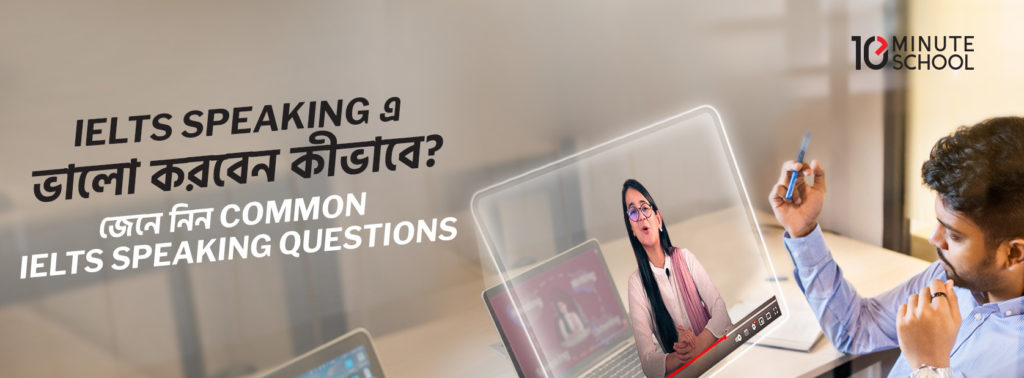
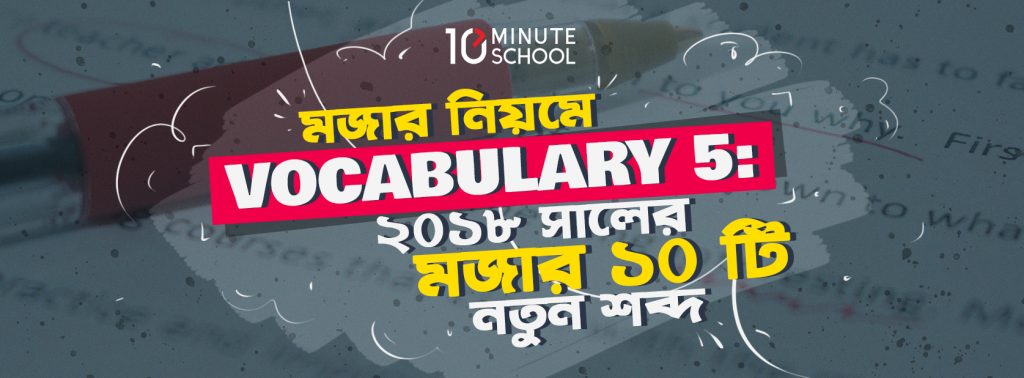

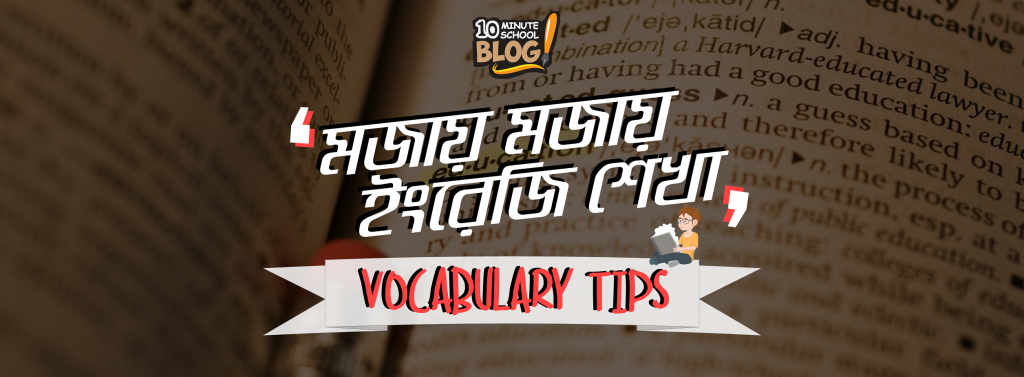


আপনার কমেন্ট লিখুন